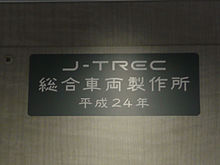
The Tokyu Corporation, a contraction of and formerly Tōkyō Kyūkō Dentetsu kabushiki gaisha until 2 September 2019, is a Japanese keiretsu or conglomerate headquartered in Shibuya, Tokyo. While a multinational corporation, its main operation is the Tokyu Railways Company, Ltd., a wholly-owned subsidiary operating railways in the Greater Tokyo Area.

The Sagami Railway Company, Ltd., or Sōtetsu (相鉄), is a private railway company operating three lines in Kanagawa Prefecture, Japan. It is a wholly owned subsidiary of holding company Sōtetsu Holdings, Inc. Sōtetsu Holdings is listed on the Tokyo Stock Exchange; 6.58% of it is owned by the Odakyu Electric Railway Company.

Kinki Sharyo Co., Ltd. is a Japanese manufacturer of railroad vehicles based in Osaka. It is an affiliate company of Kintetsu Corporation. In business since 1920 as Tanaka Rolling Stock Works, and renamed The Kinki Sharyo Co., Ltd in 1945, they produce rolling stock for numerous transportation agencies, ranging from Shinkansen high-speed trains to light rail vehicles. Kinki Sharyo is listed on the Tokyo Stock Exchange as TYO: 7122.

The Kawasaki Railcar Manufacturing Company is the Japanese rolling stock manufacturing subsidiary of Kawasaki Heavy Industries. Since beginning operations in 1906, the company has produced more than 90,000 railroad cars.

Nippon Sharyo, Ltd. , formed in 1896, is a major rolling stock manufacturer based in Nagoya, Japan. In 1996, it abbreviated its name to "日本車両" Nippon Sharyō. Its shortest abbreviation is Nissha "日車". It was a listed company on Nikkei 225 until 2004. It is listed on the Tokyo Stock Exchange and Nagoya Stock Exchange as ticker 7102. In 2008, Central Japan Railway Company became the majority shareholder (50.1%) of the financially struggling Nippon Sharyo making the firm a "consolidated subsidiary" of JR Central. In July 2012 Nippon Sharyo USA started production in their new facility in Rochelle, Illinois. The facility closed at the end of October 2018 due to a lack of orders.

The Tokyu 7600 series was a commuter electric multiple unit (EMU) train type operated by the private railway operator Tokyu Corporation in Japan from 1 May 1986 until 10 February 2015. They were all rebuilt from 7200 series trains dating from 1967 to 1972.

The Odakyu 3000 series is an electric multiple unit (EMU) commuter train type operated by the private railway operator Odakyu Electric Railway in Japan. First introduced on 10 February 2002, a total of 336 cars were built with orders divided between Nippon Sharyo, Tokyu Car Corporation, and Kawasaki Heavy Industries. Originally formed as six- and eight-car trainsets, additional cars have been built since 2010 to augment pre-existing sets to ten cars.

The Tokyu 7000 series is an electric multiple unit (EMU) train type operated by the private railway operator Tokyu Corporation on the Ikegami and Tokyu Tamagawa lines in Japan since December 2007.
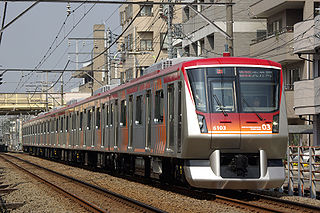
The Tokyu 6000 series is an electrical multiple unit (EMU) train type operated by the private railway operator Tokyu Corporation on express services on the Tokyu Oimachi Line in Japan since 28 March 2008. Based on the 5000 series design, cars have four sets of doors per side with a more aerodynamic front end design than its predecessors.
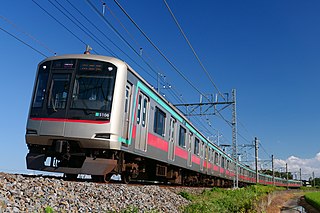
The Tokyu 5000 series is an electric multiple unit (EMU) train type operated by the private railway operator Tokyu Corporation since 2002 on many of its commuter lines in the Tokyo area of Japan.
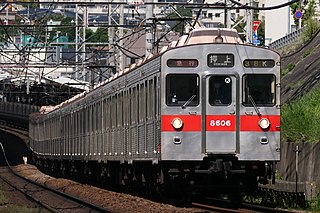
The Tokyu 8500 series is a commuter electric multiple unit (EMU) train type operated by the private railway operator Tokyu Corporation on the Tokyu Den-en-toshi Line and Tokyu Oimachi Line in the Tokyo area of Japan from 1975 until 2023, and the Jabodetabek area of Indonesia since 2006.

The Sakuma Rail Park was an open-air railway museum located next to Chūbu-Tenryū Station on the Iida Line in Hamamatsu, Shizuoka, Japan. It was operated by Central Japan Railway Company, and was opened on 21 April 1991. The museum closed on 1 November 2009 in preparation for the move to a new SCMaglev and Railway Park in Nagoya in 2011.

The SCMaglev and Railway Park is a railway museum owned by Central Japan Railway Company in Nagoya, Japan. The museum opened on 14 March 2011.

The Tokyu 2000 series, reclassified Tokyu 9020 series from 2019, is a Japanese commuter electric multiple unit (EMU) train type operated by Tokyu Corporation in the Tokyo area since 1992. They were used on Tokyu Den-en-toshi Line and Tokyo Metro Hanzomon Line inter-running services from 1992 until 2018, as well as the Tokyu Oimachi Line since 2018. Three 10-car sets were built by Tokyu Car Corporation between 1992 and 1993, all of which were shortened to 5-car sets by March 2019.
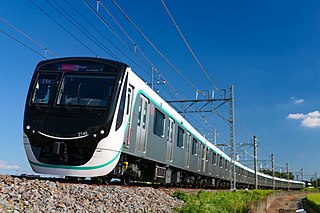
The Tokyu 2020 series is an electric multiple unit (EMU) commuter train type built by J-TREC and used by the Japanese private railway operator Tokyu Corporation in the Tokyo area since March 2018. The 2020 series is used primarily on the Tokyu Den-en-toshi Line while its derivatives, the 3020 series and the 6020 series, are used mainly on the Tokyu Meguro Line and Tokyu Oimachi Line respectively.
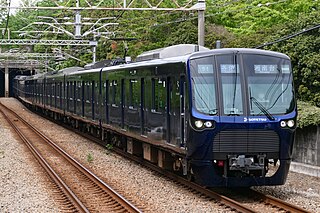
The Sotetsu 20000 series (相鉄20000系) is an electric multiple unit (EMU) commuter train type operated by the private railway operator Sagami Railway ("Sotetsu") in Japan in the Tokyo area since February 2018. Ultimately intended to be used on through-running services between Sotetsu and Tokyu Corporation lines commencing in late fiscal 2022, the first train entered revenue service on 11 February 2018, replacing a 7000 series set.

The Tōkyū Shin-Yokohama Line (東急新横浜線) is a commuter line operated by Tokyu Corporation connecting Hiyoshi Station on the Tōkyū Tōyoko and Meguro lines to Shin-yokohama Station on the Sōtetsu Shin-Yokohama Line. Tōkyū has put its company name as a formal part of the line name, which is a second for Tōkyū, following the Tōkyū Tamagawa Line.

The Tokyu 5200 series was an electric multiple unit (EMU) train type operated by the private railway operator Tokyu Corporation in Japan from 1958, and later by Ueda Kotsu until 1993.
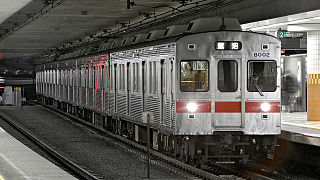
The Tokyu 8000 series was a commuter electric multiple unit (EMU) train type operated by the private railway operator Tokyu Corporation in Japan from 1969 until 2008. A number of 8000 series trains are still operated by Izukyū Corporation in Japan and on the KRL Commuterline network operated by KAI Commuter in Indonesia.

The Tokyu 9000 series is a Japanese commuter electric multiple unit (EMU) train type operated by the private railway operator Tokyu Corporation in the Tokyo area of Japan. Introduced into service in March 1986, 14 eight-car sets and a five-car set were built between 1986 and 1991 by Tokyu Car Corporation for use on the Tokyu Toyoko and Oimachi lines. Between 2009 and 2013, the 9000 series sets allocated to Toyoko Line operations were transferred to the Oimachi Line.
